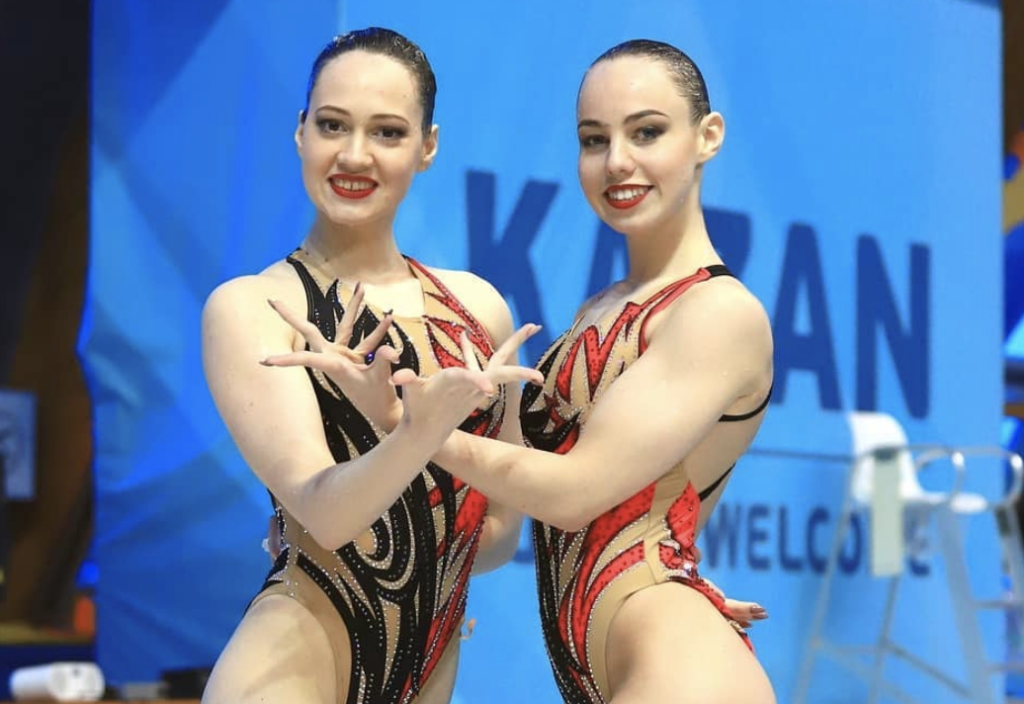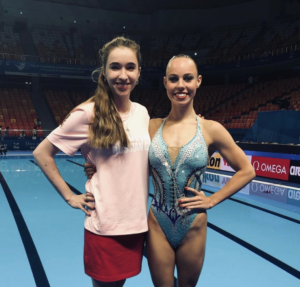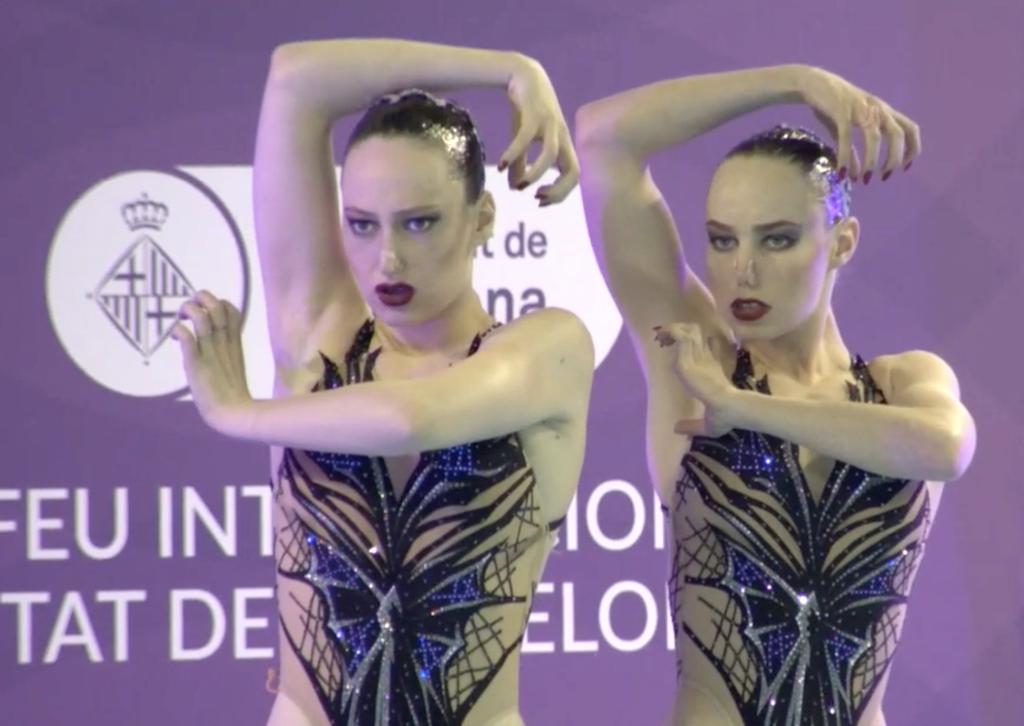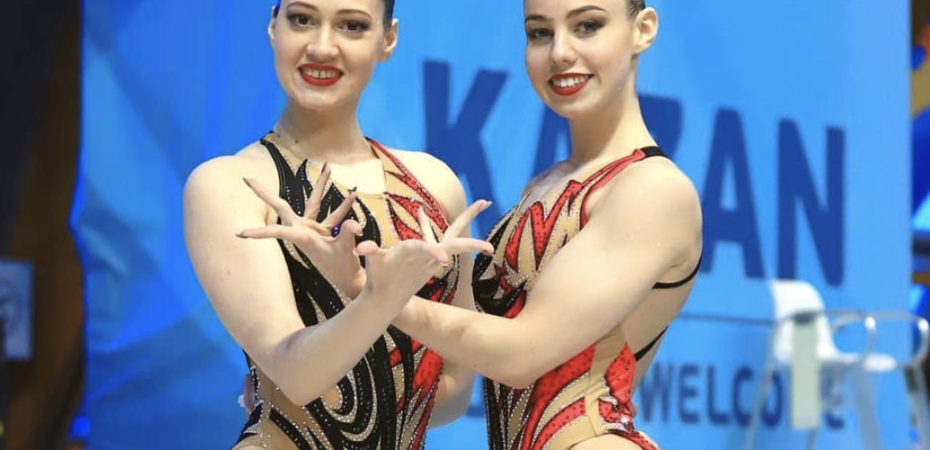If not for the COVID-19 pandemic, Belarusian artistic swimmers, like their fellow competitors from over 20 countries, would probably be preparing for the Tokyo Olympic Games right now.
The duet of Vasilina ‘Vasia’ Khandoshka and Daria ‘Dasha’ Kulagina was formed two years ago. By that time, both athletes had already achieved high results in the sport. Khandoshka won two silver medals at the 2016 COMEN Cup, one of the major international events for the 13-15 age group, and is a two-time junior European champion in figures in 2018 and 2019, a first in Belarusian artistic swimming history.
On her side, Kulagina was a member of the 13-15 and junior Russian national teams from 2012 to 2017. She won many gold or silver medals at the junior European and junior World Championships from 2014 to 2017, and also earned three golds at the European Games of 2015.
But they each achieved these results competing for different countries. Khandoshka was born and raised in Belarus, Kulagina in Russia. Their paths crossed at their club in Moscow as both were led by Elena Vyacheslavovna Voronova, Honored Coach of Russia, who also works alongside Tatiana Danchenko, coach of the Russian senior national duet.
Ultimately, Kulagina took the Belarusian citizenship and received in August 2019 the official clearance from FINA. By then, the qualification of the Belarusian pair for the 2020 Games already seemed like a formality, with the results of previous competitions proving that they could easily earn a spot to Tokyo. But like everybody, they now have to wait for another year.
However, Belarusian athletes were in a better position than many others. The country did not implement any lockdown measures, and national teams didn’t interrupt their training, although their schedule changed significantly. So instead of returning to Moscow which was already moving towards a lockdown, the pair decided to stay in Minsk, Belarus, after the national championship in February, where they won the free duet program with a score of 88.1667.

Inside Synchro: Girls, how is your training going right now?
Vasilina Khandoshka: Even in such a difficult time, we still had the opportunity to train. Many teams experienced greater difficulties with their training and globally suffered from the fact that they couldn’t work. Now, we train in the gym for general fitness, choreography, or stretching, and we also have swimming sessions in the water where we work on verticals or strength training. We do our duet routines much less often. We try to clean it up step by step to achieve perfection.
IS: Now, there is more time before the start of the Olympics. This, for sure, has benefited the duet, which so far lacks competitive practice…
VK: Yes. This is an additional opportunity for us to practice and improve all our skills. And among other things, we are gaining experience.
IS: So you don’t change the routines, just polish them?
VK: It will be a surprise…

IS: How do you keep in touch with your Russian coach Elena Voronova?
VK: We talk with her and we keep in touch really well. We also have online training [Voronova often live streams her individual coaching sessions on Instagram], but so far it’s only outside of the pool and in the gym.
IS: How was your training process before the pandemic?
VK: We trained mostly in Moscow. We came to Minsk just before the competition to go there with the team. Before the pandemic, we put more emphasis on the duet and spent more time doing these routines. Now we devote more time to general, physical training.
IS: In Trud [a renowned sport’s club in Moscow], you train alongside some of the world’s leaders in synchronized swimming. Does it benefit you?
VK: Of course, although we are also high-level athletes! Dasha used to perform in the Russian national team with some of these athletes and placed first in many competitions. Therefore, during training there are no special differences between us. We get along very well with each other, and each one learns something from the other.
IS: Do you work in the duet only, or in the team events as well?
VK: If we are asked for help in the team, of course we are ready. We very much listen to the head coach of the Belarusian team Elena Svetlichnaya, and we are ready to join the team at any time when it’s necessary. We know all the team routines and sometimes take part in joint training.
IS: How did your duet with Dasha form?
VK: We trained together with Elena Voronova in the same group. And somehow such an idea appeared, so we decided to get together. Elena Vyacheslavovna said that it was a good idea and fully supported us in this.
IS: Was Dasha not afraid of certain difficulties due to the fact that you represented different countries?
Daria Kulagina: There are always difficulties, and there was a time to think, but the support of Elena Vyacheslavovna also influenced the final decision.
VK: We were told that we are very similar, and it clearly shows in the water.
DK: We even get asked, “Are you sisters?!”
IS: What else do you have in common besides similar legs and lines?
VK: We learn a lot from one another, and try to borrow and use each other’s strengths. We also live together.
IS: Do disputes and misunderstandings arise, especially if you spend so much time together?
VK: Like all people, we have disagreements sometimes, but this is all solved fast and doesn’t cause any problems. In general, we are good friends.
Last season, Khandoshka and Kulagina swam together in the duet events at a few FINA World Series meets, where clubs are allowed to enter. As Kulagina’s citizenship change wasn’t approved until August 2019, the two couldn’t represent the country before then and thus swam for the Belarusian Republican Olympic Training Center.
For the major international events like the European Cup or the FINA World Championships, Khandoshka was paired with Valeria Valasach, who served as the alternate when Kulagina could compete, to represent Belarus. At worlds, Khandoshka and Valasach placed 15th in the free duet and 16th in the technical duet. Kulagina finally received FINA’s approval to swim for Belarus one month later, unfortunately when all major international competitions had already finished.

IS: You were not able to perform in the duet at a major competition last year. This season, international meets are simply gone. Do such circumstances add pressure on you two?
VK: No, we still work, we know what we are preparing for and what we are striving for. And we know what result we should show.
IS: The Olympic Games are the main goal. But you still have to qualify for them. How do you mentally prepare for it?
VK: Our main goal is to exceed our own points, and get a result that we haven’t shown yet. This is just another competition in which we must show what we are capable of.
IS: Artistic swimming is a judged sport, where much depends not only on athletes, but also on judges…
VK: There are different situations, but when we don’t get the score we’d like, we try not to pay attention to it, and to convince the judges even more next time. Because if we are head and shoulders above, we will be given good scores. That’s how we must make our point.
IS: Tell us about how you both got into the sport.
DK: My parents brought me there because I was very flexible. At first, they wanted to send me to rhythmic gymnastics, but thought that there were a lot of injuries. So they chose a less traumatic sport, especially since I loved water. They put me in synchronized swimming when I was four years old.
VK: My father was a swimmer, also of a good level. He achieved good results there. I always wanted to be like dad. But synchronized swimming is a more feminine sport, graceful and beautiful, so we decided together that we could try it. I also started at four years old, but at first I learned to swim. Then everything went from there.
IS: What are your most significant achievements?
DK: The European games, probably. I won gold in the duet, team and free combination.
VK: It all started in 2014 at the COMEN Cup, where I obtained a historical result for Belarus [she placed 17th in figures at the age of 13]. After that, we decided to contact Elena Vyacheslavovna to develop my abilities even more. In 2016, I took part in my first junior Europeans. I got fourth in solo and seventh in the figures. Then, there were junior worlds, and I also placed seventh in the figures competitions. And again after that, there was the COMEN Cup, where I took second place in figures and second place in the solo event.
IS: Vasilina, in 2018 you became the first Junior European champion of Belarus by winning gold in figures. A year later, you defended your title (80.6500). That year, the entire podium turned out to be Belarusian. It seems that the figures competition is excellent for the country, and this indicates this team has a good technical base…
VK: Yes, we are improving. We have medals in this event, and we won them with certain scores, which also says a lot. Before in order to take the first place in figures, it was necessary to receive over 80 points, but this level has remained even now without every nation entered [Technical routines have replaced figures at the junior level since 2018, but the event is still held at the Junior European Championships]. Even you need a little more than that if you want to win.
IS: You moved to Russia when you were 14 years old. This is quite young…
VK: My parents came with me at first, and then I lived there with my mother. They helped me with everything they could. We immediately went to the Trud club, Elena Vyacheslavovna watched me, and said she would try to work with me.
IS: What were the first tips she gave you?
VK: It was so long ago that I don’t remember, but I have grown a lot over this period. I am very glad that I was able to get into her training group.
IS: For Dasha, it is the opposite situation… How long did you think before accepting the Belarusian citizenship?
DK: No one makes such a decision right away. I had been thinking for a month or two, contemplating the advantages and disadvantages. And then we made a joint decision with my parents, Vasia’s parents, and our coach Elena Vyacheslavovna. We decided that we must go for it.
IS: How did you adapt to life in Belarus these last few months?
DK: At first, of course, it was hard. But you don’t get bored with Vasia!
IS: Surely, she introduced you to her social circle. Which athletes do you communicate with most?
VK: Probably the divers. I have good relations with both Belarusian and Russian divers.
DK: In Russia, athletes from all sports trained separately, so we didn’t communicate a lot. But here I have few friends.
VK: We also talk a lot with both our girls and Russian synchronized swimmers. We maintain a very good relationship.
IS: How do you spend your free time?
VK: We go to my parents’ house, where I have a big dog. We also have barbecues with my parents, or we take a walk sometimes. I introduced Dasha to the city.
IS: Dasha, how is Minsk compared to Moscow in your opinion?
DK: If you go outside Minsk there is beautiful nature right away. You will not see this in Moscow. There, you need to go really far to see it.
IS: Back to synchronized swimming. What are your favorite routines?
VK: The duet “Witches” [in 2019] and the solo “Firebird” [in 2018].
DK: “The Agents” duet that I did in Baku [at the European Games], and I really like our current duet. As for team, it is “Snakes”, which we performed in 2016 at the Junior World Championships.
IS: Who is the main inspiration in the creation of a routine? Is it Elena Voronova or is it a joint work?
VK: Yes, we create together. We look for music and send it to Elena Vyacheslavovna. She tells us which theme is better to use, or if maybe we need something faster or slower. We always make decisions together.
IS: And in solo? Is it more the contribution of a coach, or do you like to add something from yourself?
VK: Elena Vyacheslavovna encourages us to take part in the creation, which teaches us something, but she corrects everything so it helps. She invents the biggest part. She relies more on us to choose the music.
IS: Do you feel close to your image of Alice in Wonderland in the new solo?
VK: It is close to me, I managed to get into a character, but I think I’m capable of something bigger in terms of solo. And perhaps you will see this soon!
IS: Which of your routines is the most difficult?
VK: Probably our free duet “Witches,” and my free solo. But in principle, all of our routines are very complex, with a lot of underwater parts, thrusts…
IS: Have you ever had to make something easier in your routines?
VK: We would rather make it more complicated, of course!
Article by Vlada Sorokina
Cover photo by Aleksandr Pchelnikov.
If you’ve enjoyed our coverage and are looking forward to it during the 2020 offseason and the 2021 season, consider donating to Inside Synchro! Any amount helps us run the site and cover meets.


[…] fans have yet to see Belarus‘ Olympic hopeful duet of Vasilina Khandoshka and Daria Kulagina, who have not competed since 2019. Khandoshka and […]